The Test of Time
Longitude tells the story of a scientific breakthrough,but it's
also a tale of the triumph of the human spirit.
Rupert Smith
"You've got the hardest job of all," says Charles Sturridge over lunch at Leavesden Studios, Hertfordshire, where he's filming the drama Longitude. "You've got to persuade your readers that this isn't just a story about some old clocks." The fact that Longitude (Sunday, Monday C4) is, in fact, a story about some old clocks didn't stop hundreds of thousands of readers from devouring the book of the same name by Dava Sobel. Nor did it dampen the enthusiasm of Michael Gambon and Jeremy Irons for signing up for the film. In fact, there's something about this tale that inspires a certain evangelical gleam in the convert's eye. Why? "Practically everyone who approaches this story does so from a position of ignorance," says writer and director Sturridge,who brought Brideshead Revisited and Gulliver's Travels to TV. "You don't know who John Harrison is, and you don't know why his invention of the marine chronometer in the 18th century is important, let alone interesting. And then, as you go along, you realise that timekeeping is the key to navigation, and navigation is not only the key to exploration, and commerce, and empire, and war, but also to our whole concept of where we are in relationship to the world. Until John Harrison invented a reliable clock, time was a vague concept. Now, we take for granted the fact that there is a "right" time, and we live our lives round it. What's so brilliant about Dava Sobel's book is that it takes a seemingly obscure point in scientific history and reveals it as one of the key elements of the modern world." Sobel's book, and Sturridge's film, starts with the story of the wreck of an English fleet at the Scilly Isles in 1707. Admiral Sir Cloudisley Shovell was leading his warships home after a successful skirmish with the French off the coast of Gibraltar. The weather was foggy and overcast; the navigators, reliant on inaccurate charts, calculated they were just off the Brittany peninsula. But one of the sailors thought otherwise, and risked his life to tell the officers he thought they were wrong. The sailor was hanged on the spot for insubordination, shortly before he was proved to be absolutely right. The fleet was, in fact, just off the Scilly Isles. The flagship Association struck the rocks and went down with all hands. It was followed by three more of the fleet, and a loss of nearly 2,000 lives. Only two men survived ; ironically, one of them was Cloudisley Shovell himself, who was washed up on the beach, only to be murdered by a woman who stole his ring. This disaster, and many others on a lesser scale, prompted Parliament to pass the Longitude Act of 1714, offering a prize of £20,000 to anyone who could find a reliable method of measuring Longitude (the position east-west). Latitude (the position north- south) was a relative cinch: it can be measured by the length of the day, or the height of the sun. But Longitude was a different matter. Indeed, scientists of the day were convinced that its secret lay in observing the heavens. But the most practical solution turned out to be dependent on time. If it's 00:00 at the Greenwich meridian, and 01 :00 where you are, then you are 15 degrees of Longitude east. Local time can be measured by observing when the sun reaches its zenith; you then compare it to GMT, work out the difference, translate that into degrees of Longitude and you can pinpoint your position. All you need is an accurate, ocean-going clock that will keep to GMT. And there's the problem. Clocks in the 18th century were unwieldy, pendulum-driven affairs that would go to pieces with the slightest movement, and would definitely not survive buffeting at sea. What was needed was a clock that would keep perfect time, unaffected by movement, changes in temperature or humidity. Comes the hour, comes the man.
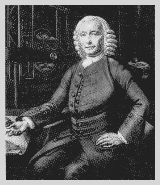 John Harrison (l693-l776) was a self-taught English
clockmaker who, by the age of 20, was building timepieces that were miracles
of engineering.He was convinced the key to measuring Longitude lay
in the accurate measurement of time. Over 40 years he invented a series of
clocks that wrestled with the problem of marine chronometry - and finally
won. Against the prejudice of the scientific establishment, he claimed the
prize offered in the Longitude Act - and it's this conviction and
struggle that provide the drama in the TV dramatisation of Longitude.
This is a film that very nearly wasn't made."I used to have a standing joke
with my brother that one day Longitude would be a movie,'' says Dava
Sobel, the American journalist whose fascination with Harrison's story led
first to a magazine article and then to the bestselling book. "I was having
such
John Harrison (l693-l776) was a self-taught English
clockmaker who, by the age of 20, was building timepieces that were miracles
of engineering.He was convinced the key to measuring Longitude lay
in the accurate measurement of time. Over 40 years he invented a series of
clocks that wrestled with the problem of marine chronometry - and finally
won. Against the prejudice of the scientific establishment, he claimed the
prize offered in the Longitude Act - and it's this conviction and
struggle that provide the drama in the TV dramatisation of Longitude.
This is a film that very nearly wasn't made."I used to have a standing joke
with my brother that one day Longitude would be a movie,'' says Dava
Sobel, the American journalist whose fascination with Harrison's story led
first to a magazine article and then to the bestselling book. "I was having
such
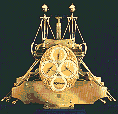 a
hard time even selling it to a magazine, so I suppose it was a kind of fantasy,
a pipe dream." "I read the book when it came out and thought 'Well, that's
wonderful, but of course it will never make a film'," says Sturridge. "Its
whole structure seemed to me to be anti-dramatic. Then Granada came to me
in September 1998 and said it had bought the rights to the book. Channel
4 was keen to have it as its big millennium offering, and Granada told me
if I could find a way of telling the story the project was mine. I have a
weakness for projects that seem impossible, so I said yes." Sturridge's first
challenge was to find a way of turning Sobel's factual account into drama.
"I knew from the word go that it was full of exciting ideas, but that's not
enough to make it dramatic. I had to find a device that would keep the audience
hooked. "His solution lay in promoting a minor character, little more than
a footnote in Sobel's book, into a pivotal position.
a
hard time even selling it to a magazine, so I suppose it was a kind of fantasy,
a pipe dream." "I read the book when it came out and thought 'Well, that's
wonderful, but of course it will never make a film'," says Sturridge. "Its
whole structure seemed to me to be anti-dramatic. Then Granada came to me
in September 1998 and said it had bought the rights to the book. Channel
4 was keen to have it as its big millennium offering, and Granada told me
if I could find a way of telling the story the project was mine. I have a
weakness for projects that seem impossible, so I said yes." Sturridge's first
challenge was to find a way of turning Sobel's factual account into drama.
"I knew from the word go that it was full of exciting ideas, but that's not
enough to make it dramatic. I had to find a device that would keep the audience
hooked. "His solution lay in promoting a minor character, little more than
a footnote in Sobel's book, into a pivotal position.
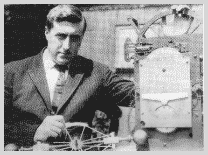 Rupert Gould was a naval officer who, in 1920, came across
Harrison's clocks in a state of neglect and offered to restore them to working
order. Over the ensuing years he lost his wife and his job and suffered a
nervous breakdown - but his dedication never faltered. "I felt that Gould's
story paralleled Harrison's in an interesting way," says Sturridge. "They
were both obsessed by the clocks ; they both paid a high personal price for
their convictions." The role of Gould was sufficiently attractive to lure
Jeremy Irons out of a two-year sabbatical (since completing Lolita and The
Man with the Iron Mask he's been rebuilding a Norman castle in
Rupert Gould was a naval officer who, in 1920, came across
Harrison's clocks in a state of neglect and offered to restore them to working
order. Over the ensuing years he lost his wife and his job and suffered a
nervous breakdown - but his dedication never faltered. "I felt that Gould's
story paralleled Harrison's in an interesting way," says Sturridge. "They
were both obsessed by the clocks ; they both paid a high personal price for
their convictions." The role of Gould was sufficiently attractive to lure
Jeremy Irons out of a two-year sabbatical (since completing Lolita and The
Man with the Iron Mask he's been rebuilding a Norman castle in
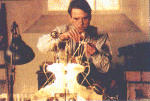 Ireland). "I don't know if I would have done it if it
hadn't been Charles Sturridge," he says. " I've wanted to work with him again
since we did Brideshead Revisited. Then I found out that Gambon was on board,
and I liked the book a lot, and it's nice to get my face on TV around the
new millennium. But this is not "Jeremy Irons returns to British TV".There's
less and less good TV around, and not many jobs that are attractive to me."
; Sturridge is adamant that this is the sort of TV we should be encouraging
in the new century. "People may regard Longitude as an intellectual
drama, in other words as something that not many people are going to enjoy,
which I think just reveals a lack of imagination. Longitude is the
most commercial, watchable film I've done, and I don't see it as being
intellectually demanding; on the contrary, it's built to be as embracing
as possible.It's as unputdownable as an Inspector Morse, but for different
reasons."
Ireland). "I don't know if I would have done it if it
hadn't been Charles Sturridge," he says. " I've wanted to work with him again
since we did Brideshead Revisited. Then I found out that Gambon was on board,
and I liked the book a lot, and it's nice to get my face on TV around the
new millennium. But this is not "Jeremy Irons returns to British TV".There's
less and less good TV around, and not many jobs that are attractive to me."
; Sturridge is adamant that this is the sort of TV we should be encouraging
in the new century. "People may regard Longitude as an intellectual
drama, in other words as something that not many people are going to enjoy,
which I think just reveals a lack of imagination. Longitude is the
most commercial, watchable film I've done, and I don't see it as being
intellectually demanding; on the contrary, it's built to be as embracing
as possible.It's as unputdownable as an Inspector Morse, but for different
reasons."
Longitude
Sunday 9.00pm/Monday 8.30pm C4 [Ref:Video JB15]
If you are weary of tinsel covered TV programmes with "Christmas Special"
in their titles, you will delight in this gentle and languidly beautiful
two- part dramatisation of Dava Sobel's huge bestseller. And there isn't
a string of fairy lights in sight. Michael Gambon, adding to his repertory
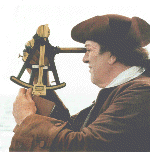 of historical characters, is magnificent as the self-
taught 18th-century clockmaker John Harrison; his fierce commitment to inventing
a life-saving clock, which could measure longitude at sea, takes him from
his Yorkshire workshop to nauseous voyages and clashes with the upper echelons
of government and the Admiralty.There was a pressing imperative for the
construction of such a device;ships had no reliable way of assessing their
positions on the world's oceans, which resulted in shipwrecks and enorrnous
loss of life. Harrison's journey of discovery is paralleled with that of
Rupert Gould (Jeremy Irons), a naval officer who becomes similarly obsessed
in the 1920s with restoring Harrison's clock to its former glory, something
he achieves only at great personal cost. The adaptation by director Charles
Sturridge (Brideshead Revisited, Gulliver's Travels) has an enormous historical
sweep, which inevitably leads to a lot of leapfrogging from century to century
between the two stories. This is initially jarring and confusing. But once
the twin tales have been established, Longitude becomes an absorbing story
which, though epic in scale, is a very small human tale of humanity, hope
and triumph. It is a measure of our involvement in the lives of these people
that when Harrison embarks on his first, sick-making experimental sea voyage
with the monstrously huge timepiece, we really want him to succeed.
of historical characters, is magnificent as the self-
taught 18th-century clockmaker John Harrison; his fierce commitment to inventing
a life-saving clock, which could measure longitude at sea, takes him from
his Yorkshire workshop to nauseous voyages and clashes with the upper echelons
of government and the Admiralty.There was a pressing imperative for the
construction of such a device;ships had no reliable way of assessing their
positions on the world's oceans, which resulted in shipwrecks and enorrnous
loss of life. Harrison's journey of discovery is paralleled with that of
Rupert Gould (Jeremy Irons), a naval officer who becomes similarly obsessed
in the 1920s with restoring Harrison's clock to its former glory, something
he achieves only at great personal cost. The adaptation by director Charles
Sturridge (Brideshead Revisited, Gulliver's Travels) has an enormous historical
sweep, which inevitably leads to a lot of leapfrogging from century to century
between the two stories. This is initially jarring and confusing. But once
the twin tales have been established, Longitude becomes an absorbing story
which, though epic in scale, is a very small human tale of humanity, hope
and triumph. It is a measure of our involvement in the lives of these people
that when Harrison embarks on his first, sick-making experimental sea voyage
with the monstrously huge timepiece, we really want him to succeed.
Alison Graham
Radio Times 1-7 January 2000
Letters
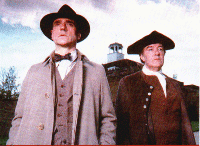 After a glut of costume dramas over the festive period,the
prospect of 240 minutes of yet another one with Longitude [2/3
January,C4,starring Jeremy Irons and Michael Gambon,above] gave the title
itself a sense of foreboding for me.How wrong I was (like Lord Morton)!The
only period when time dragged was the 21 hours,25 minutes between the two
episodes.The precision of the acting and the accuracy of the writing and
the direction matched the timepieces themselves.The movement was smooth,jewelled
and nearly perfect,the final result easily accessible and groundbreaking.Many
thanks to all concerned.
After a glut of costume dramas over the festive period,the
prospect of 240 minutes of yet another one with Longitude [2/3
January,C4,starring Jeremy Irons and Michael Gambon,above] gave the title
itself a sense of foreboding for me.How wrong I was (like Lord Morton)!The
only period when time dragged was the 21 hours,25 minutes between the two
episodes.The precision of the acting and the accuracy of the writing and
the direction matched the timepieces themselves.The movement was smooth,jewelled
and nearly perfect,the final result easily accessible and groundbreaking.Many
thanks to all concerned.
Roy Faithful Harestock,Hampshire
Longitude was surely television at its most excellent.Once again,fact
proved to be more gripping and entertaining than fiction.It made an excellent
start to the new year.
Peter Baldock Horbury,West Yorkshire
No frocks;just clocks.Longitude was a gripping tale.
Simon Tyrell-Lewis south-east London
Radio Times 22-28 January 2000